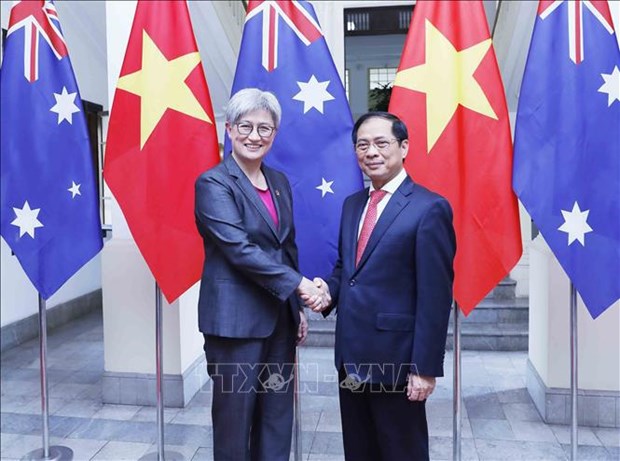Fifth Vietnam-Australia Foreign Ministers’ Meeting held in Hanoi
Foreign Minister Bui Thanh Son and his visiting Australian counterpart Penny Wong on August 22 co-chaired the fifth Vietnam-Australia Foreign Ministers’ Meeting in Hanoi.

Foreign Minister Bui Thanh Son and his visiting Australian counterpart Penny Wong on August 22 co-chaired the fifth Vietnam-Australia Foreign Ministers’ Meeting in Hanoi.
The two ministers focused discussions on the implementation of the Vietnam-Australia strategic partnership, as well as regional and international issues of mutual concern, and cooperation contents between their ministries.
They expressed their delight at the strong and steady development of the relations between the two countries. Political ties are consolidated with increasing trust, and security and defence cooperation is more effective, especially in the field of United Nations peacekeeping.
Two-way trade hit nearly 16 billion USD last year, helping Vietnam become Australia’s 10th biggest trade partner, and Australia Vietnam’s seventh largest trader. New areas of cooperation such as climate change response and energy transition are being promoted, including a support package of 105 million AUD (67.6 million USD) for Vietnam to build infrastructure to respond to climate change and develop clean energy.
The two FMs highly valued their ministries’ close coordination and cooperation, especially in serving high-level contacts and delegation exchanges, and agreed to maintain coordination in holding activities in celebration of the 50th anniversary of the establishment of diplomatic ties this year.
Exchanging views on regional and international situations, they agreed to strengthen cooperation and continue contributions to maintaining peace, stability and cooperation in the region.
Wong affirmed that Australia values cooperation and supports the central role of ASEAN, and agrees to continue promoting collaboration for the sustainable development of the Mekong sub-region.
Regarding the East Sea issue, the two officials affirmed the importance of maintaining peace, stability, safety and freedom of navigation and aviation; and respecting international law, including the 1982 UN Convention on the Law of the Sea (UNCLOS). They vowed to continue backing each country's candidates at regional and international organisations and forums, especially at the UN.

